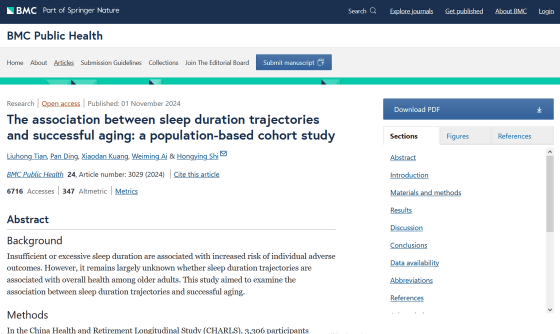Research results show that sleeping 7 hours or more a day is important for achieving healthy and happy aging 'successful aging'

Many people want to live as long as possible, but even if you live a long life, there is a big difference in happiness between living a long life while suffering from illness and living a long and healthy life. In recent years,
The association between sleep duration trajectories and successful aging: a population-based cohort study | BMC Public Health | Full Text
https://bmcpublichealth.biomedcentral.com/articles/10.1186/s12889-024-20524-7

Scientists Reveal How Much Sleep You Need For 'Successful Aging' : ScienceAlert
https://www.sciencealert.com/scientists-reveal-how-much-sleep-you-need-for-successful-aging
A research team from Wenzhou Medical University in China analysed data from 3,306 participants whose sleep habits were recorded in 2011, 2013 and 2015, and who underwent health check-ups five years later. The participants had no major chronic diseases at the start of the study, and were over 60 years old at the end of the follow-up period.
The analysis focused on whether the subjects had achieved successful aging. The research team assessed successful aging by whether they met five criteria: 'no major chronic disease,' 'no physical impairment,' 'high cognitive function,' 'good mental health,' and 'active engagement in life.' The 'active engagement in life' criteria were assessed by whether they had met with friends in the past month, played games such as mahjong, chess, or cards, or participated in local events, or participated in specific social activities.

The analysis found that only 455 participants (13.8%) met all five criteria for successful aging at the end of the follow-up period, and 307 of them (66%) consistently got at least seven hours of sleep per night.
The research team classified the participants into five groups based on their sleep habits over the four-year period: 'long stable' (always 8-9 hours on average), 'normal stable' (always 7-8 hours), 'decreasing' (decreasing from 8 hours or more to less than 6 hours), 'increasing' (increasing from less than 6 hours to 8 hours or more), and 'short stable' (always 5-6 hours).
The graph below shows the percentage of people who achieved successful aging among the five groups. The long-term stable group had a high score of 17.1%, while the normal stable group had a high score of 18.1%. The decreasing group had a score of 9.9%, the increasing group had a score of 10.6%, and the short-term stable group had a score of 8.8%.

'These findings highlight that chronic sleep deprivation and patterns of increased or decreased sleep duration are not simply age-related changes. Rather, they have emerged as important markers of impediments in the pursuit of successful aging,' the research team said.
Related Posts:
in Science, Posted by log1h_ik







